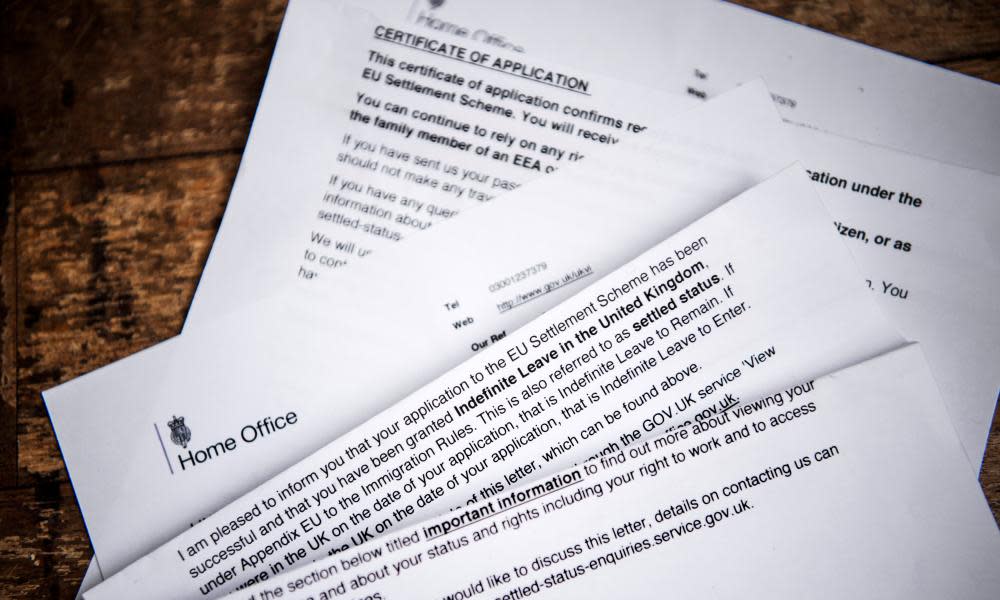130,000 EU citizens on UK benefits yet to apply for settled status, leak suggests

Fears have been raised that at least 100,000 EU citizens settled in the UK risk losing access to healthcare and other benefits, after the leak of government figures on the EU settled status scheme.
With just nine days to go before the scheme closes, the figures show that 130,000 of the 820,000 Europeans claiming benefits ranging from children’s allowance to income support have not yet applied for settled status.
The figures, leaked to the Times, suggest about 70% of those are in a vulnerable category, with more than 90,000 receiving universal credit.
From next month, people from EU countries must show they have been granted settled status or pre-settled status via an online portal before they can rent, work or claim benefits in the UK.
Campaigners have said the consequences of not applying can be life-changing, potentially including loss of a home or a job as landlords and employers face huge fines as part of the hostile environment policy.
Some local authorities are warning residents that housing benefit and council tax support will be withdrawn if they do not provide proof of status before 30 June, despite repeated government assurances that anyone who has applied for the status will have their rights protected after 1 July.
One man, a Polish national with a mental illness, has been warned by North Northamptonshire council that his claim for housing benefit and council tax support will be rejected unless he provides proof of his settled status by 26 June. The 31-year-old, who does not wish to be identified, lost his home following a breakdown and is being housed by the council in a hotel.
He applied for settled status in April and is among more than 330,000 applicants awaiting a decision from the Home Office. He fears he will be left homeless. “The stress about being evicted is having a very bad effect on my health,” he said. “The council doesn’t seem to understand that I can’t speed up the Home Office.”
A council spokesperson said: “It would appear that the resident in question has received a standard letter from the council regarding the timescales involved in providing the information to support his claim. This has been done in error and we apologise for any distress caused. The customer will be given longer to provide the information that has been requested and will be writing to him to advise of this.”
A spokesperson for Boris Johnson said on Monday: “We are making sure that anyone receiving benefits is given every opportunity to apply to the EU settlement scheme. We’re working hard to identify existing claimants who are yet to apply and encouraging them to do so. Anyone who’s applied to the scheme by the 30 June deadline will have their rights protected until the application is decided in line with a withdrawal agreement.”
The housing charity Shelter said some EU nationals could be left homeless unless the problems were addressed. “The government promised no one would be left behind when they introduced the EUSS [settled status scheme], yet hundreds of thousands could be at the end of this month,” said its chief executive, Polly Neate.
Maike Bohn, a co-founder of the3million, which represents EU citizens living in the UK, said: “We are seeing threats of eviction and withdrawal of support. It is hugely concerning that local authorities are sending frightening letters to those they have a duty to protect.”
From July landlords have to check whether tenants have settled or pre-settled status. Detailed government guidance was only released on 7 June, and lettings agents have said this leaves landlords with too little time and potentially facing fines of up to £3,000 per occupier.
“This is the first clear guidance we’ve had on how the new system will work,” said a spokesperson for Goodlord.co, a lettings platform.
The Home Office said that before 1 July, landlords “must not discriminate against EU or EEA citizens who do not yet have status or who choose to use their passport or national identity card to prove their right to rent. There is a telephone helpline if employers and landlords need any guidance on this matter.”

 Yahoo Movies
Yahoo Movies 
